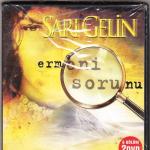"Daddy, did the Armenians slaughter us?” was the question that a father in Istanbul, doctor Serdar K., was met with one day when his daughter came back from school.
His daughter had been shown a film distributed to all primary schools by the Ministry of Education. The ministry is said to have written a letter to all schools saying that it should be screened to classes, and that schools should report back on the effects the film had on the children, aged 6-14.
Although the Ministry is now saying that the film was intended for the viewing of teachers only, some children have already been exposed to the film.
It deals with the events of 1915, when, so many Armenians and also an increasing number of Turks say, millions of Armenian citizens of the Ottoman Empire were forcibly sent into exile across to Syria. Definitions of the event range from a genocide (i.e. a deliberate plan to eradicate an ethnic group) to claims that the government was at the least negligent in letting so many people starve, die of exhaustion or be killed by gangs. The Turkish official discourse has long been to deny any wrongdoing, and rather blame nationalist Armenian gangs for causing upheaval in the Ottoman Empire and killing Turkish civilians.
Forced to go to court
Serdar K.’s daughter is in fifth grade. He says that she has been severely disturbed by the film. He has filed a complaint about the Ministry of Education, the Istanbul Educational Board and the management of his daughter’s primary school at the Üsküdar prosecutor’s office in Üsküdar, Istanbul.
In his statement, he writes:
“On 13 February, my daughter was shown the documentary ‘Sarı Gelin’ at her school without my knowledge or permission. My daughter was extremely disturbed and frightened by the film and she asked my questions like ‘Did the Armenians slaughter us?’”
“The fact that my daughter was shown such a documentary which disturbs her psychology and develops feelings of hatred by the school that I entrusted my daughter to is a direct attack on her rights and my rights as her parent. My daughter has been affected so much that even my insistence on the brotherhood of all people has been in vain. I have been forced to complain in order to achieve a punishment of those responsible.”
Court cases for incitement to hatred and compensation
Lawyer Fethiye Çetin has called on parents to go to court in order to prevent further screenings of the film. She told bianet that the Educational Board must revoke its directive to show the film and to send reports back. The Ministry of Education has denied that any central directive was sent out.
Çetin said that parents could cite Article 216 of the Turkish Penal Code, which deals with “inciting hatred among people or denigration”. If parents document that their children are affected psychologically, they could also demand compensation.
Gündem Çocuk, a children’s rights association, told bianet that they would support families going to court and follow the process. The same association has also criticised the statement by the Ministry of Education denying that schools were instructed to show it to all children.
Contrary to Convention on the Rights of the Child
If, so the assocation, it is true that the film was only meant for teachers, this still does not explain why a need for such a film was felt.
The film promotes hatred and divisions in society, exactly the kind of mentality that has driven young nationalists in Turkey to act as killers in the murders of journalist Hrant Dink, priest Andrea Santoro and the three Christian men in Malatya.It was this mentality that Hrant Dink's widow Rakel Dink referred to at his funeral procession, when she said that even murderers were babies once, and that hatred was instilled in them later.
Apart from the ideological content, the film also contains scenes of violence totally inappropriate for children of that age, a fact the Ministry should be well aware of.
Especially affected are the schools of the Armenian population in Turkey, who have already expressed their concern about the film, which they are expected to show as well.
The Ministry of Education should further have remembered that Turkey is a signatory country to the United Nation’s Convention on the Rights of the Child, signed in 1995.
Article 36 charges the state with “protect[ing] the child against all other forms of exploitation prejudicial to any aspects of the child's welfare.” (TK/AG)














